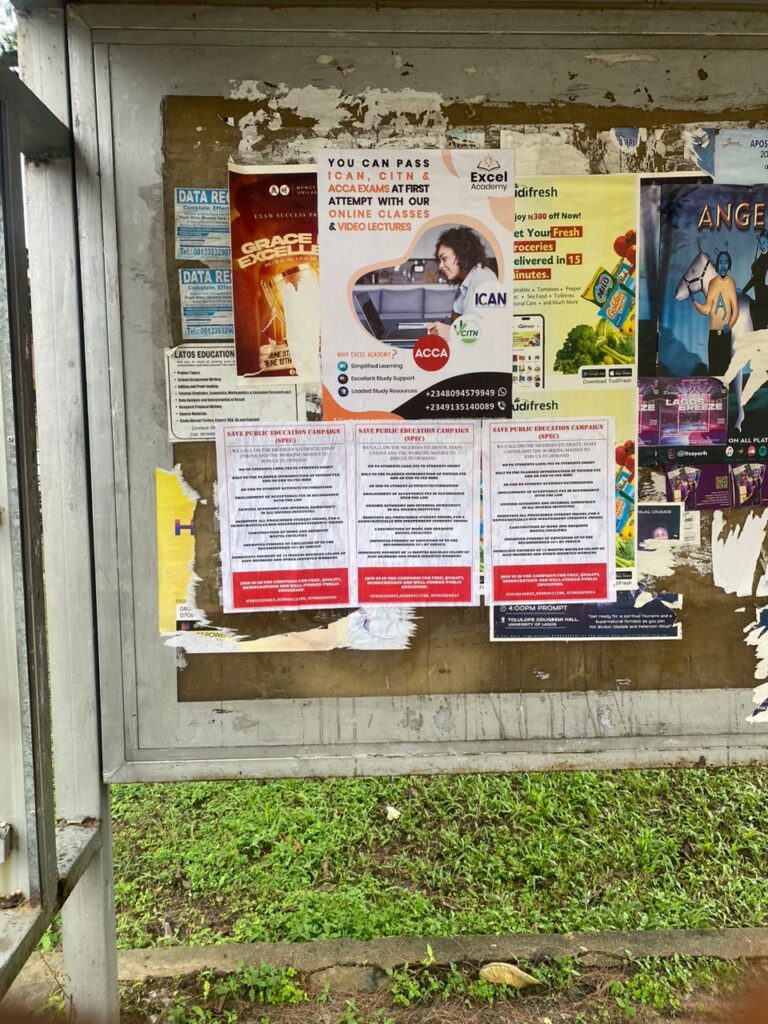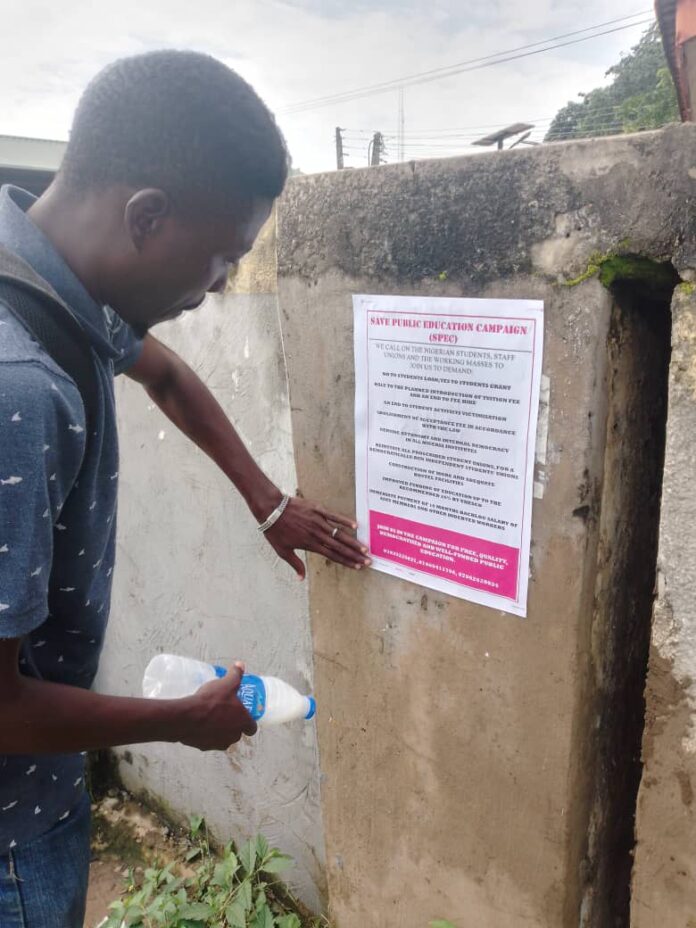Comrades from the Workers and Youths Solidarity Network have initiated a campaign to defend public education. The Save Public Education Campaign (SPEC) calls for unity of the Left, students, staff unions, parents and community organisations to join the struggle against government attacks.
The Save Public Education Campaign was formed by student activists, trade unionists, staff unions’ members and socialists. It is a youth and student’s platform against capitalism and imperialism. SPEC was launched to campaign against fees increment , for a functional and democratically-managed education system.
Last year we saw many strikes in the education sector. Strikes took place led by the Academic Staff Union of Research Institute (ASURI), the Non Academic Staff Union (NASU), the Academic Staff Union of University (ASUU) and others. All these strikes lasted for months, but still the Federal Government did not succumb. This signals that we need unity and a genuine working class movement to secure victories.
SPEC campaigns against the attempt to introduce tuition fee, hikes in school fees, students’ loans, poor studying and living conditions. SPEC is against victimization of student activists, bans of unions and other attacks on democratic rights. It stands for adequate funding of education so that the children of ordinary people can breathe.
In light of the developments in the education sector, SPEC members have started visiting campuses for leafleting and fly-posting in order to speak with students and staff union members.
Below we publish some photos of SPEC’s activities and the text which is widely distributed in different universities.
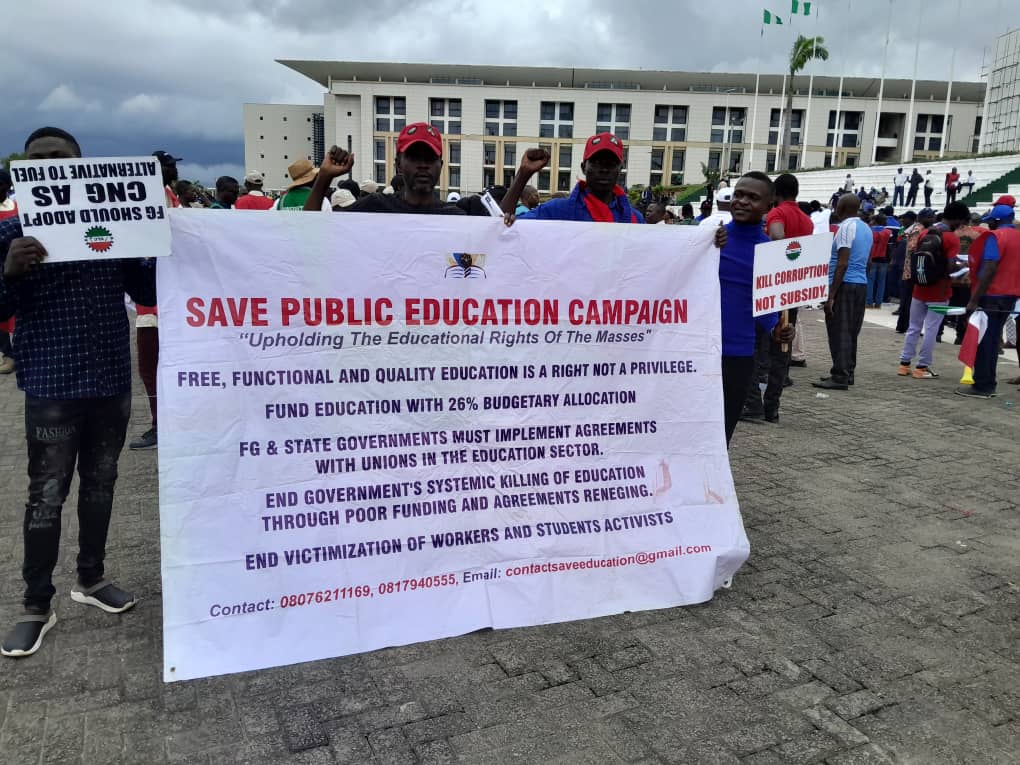
Nigerian Education Sector at the Brim of Collapse; a Clarion Call for Cooperation
#SavePublicEducation
The Nigerian education sector is facing another historic attack which demands immediate action from students, staff unions, parents, communities and well-meaning organizations. The recent introduction of students’ loan scheme and consequently the increment of payable fees across public tertiary institutions averaging over 200% are evidences to this. The Tinubu/APC regime in their first few weeks in office has further shown that the Nigerian education sector cannot be better under the capitalists ruling elites. Therefore, beyond demanding for quality and well-funded public education, workers and youths need to start mobilizing for a workers-based political party that will wrestle power from the bourgeois and enthrone a socialist government because all of these fundamental problems can only be resolved under well-planned economy system under a socialist government.
The recent and detailed report published on 13th of July, 2023 by the Guardian Newspaper showed beyond doubt that the Nigerian educational system is under siege. According to the report, “Many institutions have increased their fees by 100 to 200 per cent, which may force some students out of school.” Institutions like University of Abuja, University of Maiduguri (UNIMAID), University of Uyo (UNIUYO), University of Port Harcourt (UNIPORT), Michael Okpara University of Agriculture, Umudike (MOUAU) Federal University of Health Sciences, Azare (FUHSA), Federal University, Lafia (FULAFIA), Dutse (FUD), Federal University, Kashere (FUKASHERE), University of Ilorin (UNILORIN), University of Nigeria, Nsukka (UNN), Bayero University Kano (BUK), Niger Delta University (NDU), Nsukka, National Open University of Nigeria (NOUN), University of Ibadan (UI), Bayero University, Kano (BUK), Delta State University (DELSU), Abraka and Federal University of Technology, Owerri (FUTO) have all announced increments in their school fees and other charges payable by students. Some of these increments range from 100 – 500% across these public institutions.
These fee increments were also accompanied by mass attack on the students and staff unions alike. For instance, the management of the University of Abuja rusticated 3 students’ union leaders for signing a document to request the reconsideration of the over 250% increment in fee imposed upon them by the university management. They’re reinstated back after public outcry. Similarly in University of Ibadan who re-introduced the acceptance fee up to the tune of N50,000 per student has similarly maintained a clampdown on the students’ union activities of the school.
Hostel and accommodation facility has also been an aspect of public education that has been under attack for donkey years. Instead of improving and expanding the hostel facilities across public institutions, the government, through the different institution managements, has commercialized the system and has continued to strengthen the establishment of private hostel and accommodation facilities for the students. These private hostels averagely charge students more than 10x of the accommodation fee for public/school-owned hostel facilities. For instance, the maintenance hostel in the Obafemi Awolowo University, Ile Ife, is cited on the university land but developed by private business allies of the university management. These hostels charge students as high as N250,000 for a bed space, whereas the public/school-owned hostels cost an average of N4,000 for a bed space. This pseudo competition also led to the increment of hostel fee in institutions like FULOKOJA that increased its hostel fee from N20,000 to N60,000.
Their Excuse
To us in WYSN, there is no justification for the increments in the fees across the public tertiary institutions. In fact, the excuses presented were not tenable. According to the Vice Chancellor of University of Abuja, Rasheed Na’Allah (PhD), “the primary objective behind the increment is to make the institution’s students the best so their dreams can become a reality”. Other statements issued by different institutions to justify the fee increment have been hinged around “the only way to cushion the effect of poor funding of the institutions”. We believe that university managements should turn to the government for funding and not pile up the burden on the students.
The establishment of public education was premised on the constitutional aim of eradicating poverty and illiteracy among the citizens. In fact, education is seen as one key way to eradicate poverty and mass illiteracy among the citizens. However, Nigeria, which prices education out of the reach of the poor and working people, is ultimately subjecting its citizens to advent poverty and illiteracy.
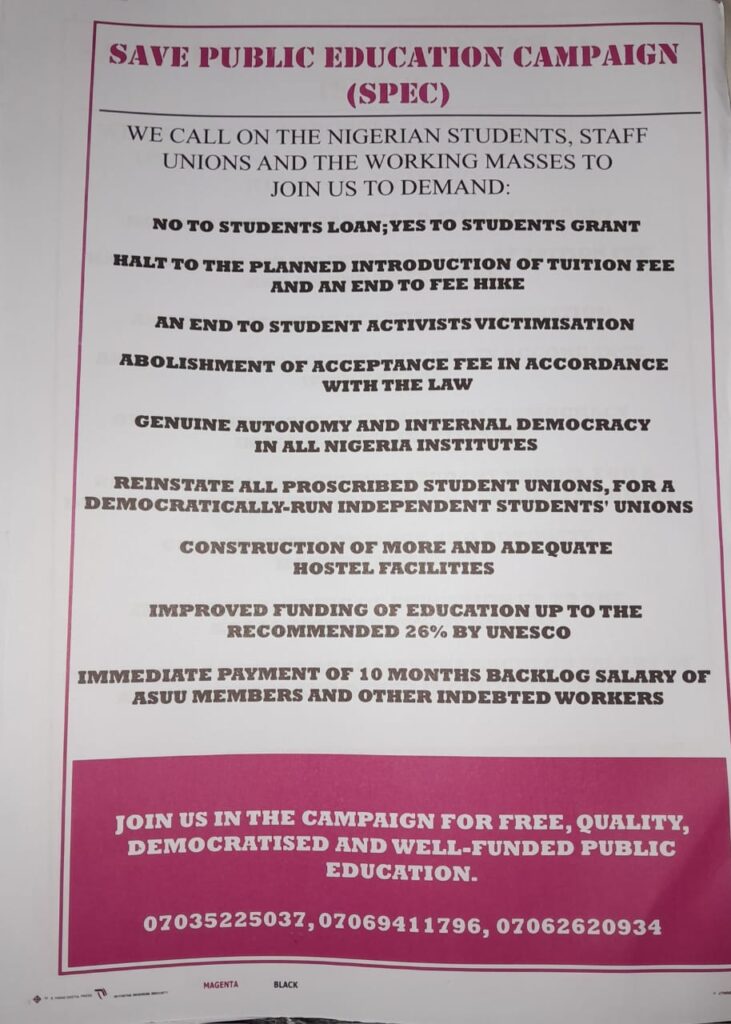
The Government Policies
The government of Tinubu/APC government inherited a collapsing education sector from the Buhari/APC government. Instead of immediately salvaging the situation, the Tinubu/APC government introduced the Students’ Loan Policy where students can take loans to pay for their education fees. This was done with the intention of commercializing and privatizing public education and in order to grant the management of Nigerian tertiary institutions the power to regulate and determine fees payable by the students. We have seen how the process of commercialization and privatization has affected the nation in other core areas of the economy. For instance, the power given to the oil marketers to determine fuel prices has resulted in an astronomical increase in the prices of fuel.
Furthermore, the student’s loan is nothing but a ploy by the Nigerian government to hands-off the financing and funding of public institutions. We believe that in a country like Nigeria with 68% poverty and 41% unemployment rate, students’ loan will only add to the already worsened economic condition. Rather, a country that is serious about driving down the poverty rate and increasing the employability of its citizens will invest massively in public education and give academic grants and not students’ loans to the students.
The method of the students’ loan policy is abysmal. The bill includes several stringent conditions such as the requirement for two guarantors on grade level 12 and above and the threat of imprisonment for defaulters. Furthermore, the bill specifies that beneficiaries will begin repaying the loans two years after completing their compulsory National Youth Service Corps (NYSC) program. With an average school fee of N150,000 – N250,000, each student may owe between N600,000 – N1,000,000 for a 4 year course or N900,000 – N1,500,000 for a 6-year course. This will not only add financial burden on the youths and reduce their employability and purchasing power when they eventually conclude their mandatory NYSC.
The Buhari regime allocated a paltry 8.8% of the budget in 2023 to education. This is ridiculously low compared to the recommended 15-20% by UNESCO for a developing a country. Up until now, all of these allocations were not reflected in the quality of education we have. As of 2022, the data released by UNESCO showed that no fewer than 20 million Nigerians between the ages of 6 and 18, which equates to 20% of the total estimated population of Nigeria, are out of school. This figure, published in the Sahara Reporters website, is bigger than the entire population of Norway, Singapore and Dubai put together.
No work no pay
The Academic Staff Union of Universities (ASUU) has also been hit by the no work no pay system adopted by the Buhari/APC led FG and has been denied more than 7 months salaries because they are demanding for the implementation of the FG-ASUU 2009 agreement and few other welfare demands. While this can be a setback for the staff union, we believe there are rich lessons that can be drawn from the event in preparation for future bigger struggles.
Only an insensitive government could jettison the demands of academic workers. There is no gainsaying that the quality of education today determines that future of the nation. Hence, an insightful government should pay maximum attention to its education sector and give it the best possible treatment. We believe that the education workers should be ranked among the top earners in the country.
The Response of the People
The events happening in the Nigerian education sector have further driven a wedge among the ranks of the people. While many people are grumbling and roaring in pain, a small layer of the population, particularly the pro-Tinubu people, are putting up cosmetic appraisals of the extreme anti-poor policies of the regime. The incidence of Students’ Loan is a case study of such division among the students’ bodies. Till date, students’ unions and the National Association of Nigerian Students have not come out openly to condemn the scheme. Even, decisions were not held among the ranks of the students to evaluate the merits and demerits of the policy which will inform the decision of the body on whether or not to accept the policy. Instead, the leadership of the NANS, in a meeting with the president, was interested on who will be in charge of disbursing the funds.
Students are the direct recipient of this policy. We believe that leadership of the various students’ movement needs to subject the emergence of the students’ loan to a debate with a view to educating the students on both the merits and demerits and draw a resolution on the position of the students.
Even beyond this, it is clear that the emergence of the Students’ Loan will further give the management of tertiary institutions reasons to increase fees and introduce insane levies across the board which is already manifested in several institutions across the country. We acknowledge the position of Academic Staff Union of Universities (ASUU) on the students’ loan policy. However, we believe this position needs to be backed up by actions in order to press home demands.
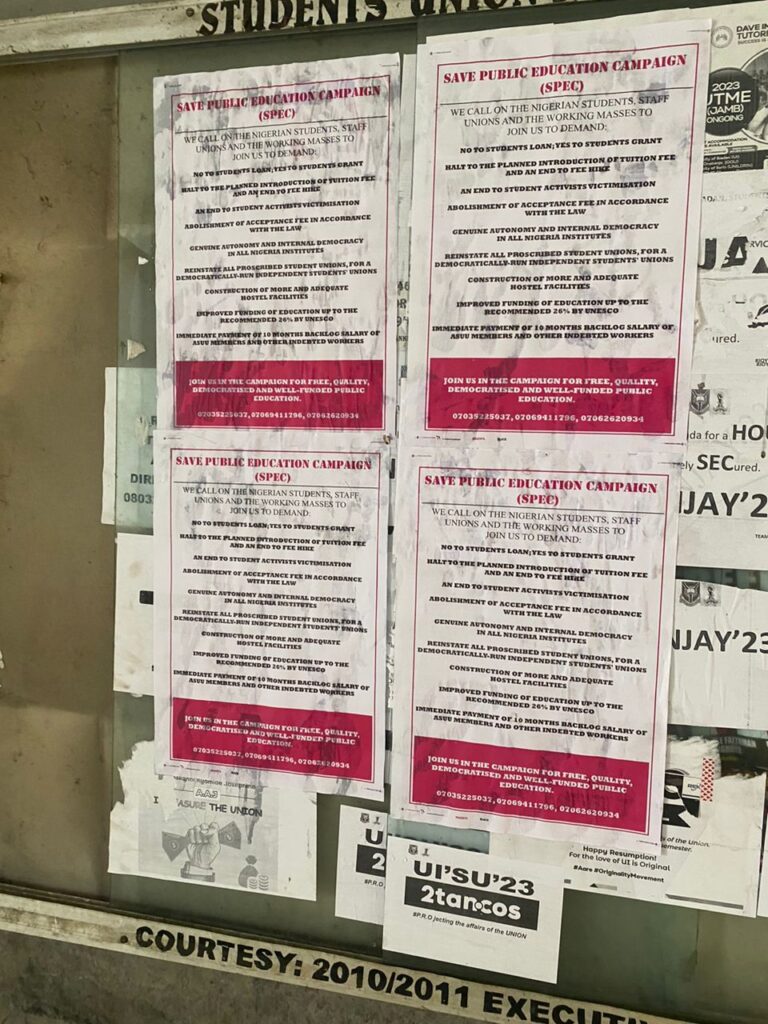
The Effects of these Increments
It is clear that the attacks on Nigerian education sector will only add burden on the working people. With a minimum wage of N30,000 and PMS Price of N600/liter, there can only be limited options for the working people. We will definitely record a high drop-out rate and hence, an increase in the number of school dropouts and out-of-school in the country. Youths will become more frustrated about the system and anger will set in. This anger will start to transform into social vices like scam, internet fraud, kidnapping, robbery, and so on. This will automatically transform into high crime rate among the society. Some set of angry youth will also graduate from excessive drinking and smoking to the formation of clubs, gangs, and cults.
The country too will be immensely affected as a result of poor enrolment in higher education. This could mean a low productivity for the country, reduction in skilled manpower, lack of adequate and qualified workers and general downgrade of the quality of the economy. We believe it is not too late for the government to repent and commence the process of adequately funding education with a view to totally reviving the nation’s public education sector.
Call to Action
The events happening particularly in the education sector is a further testimony to the rot in the APC/capitalist system of government. Following the 16-years misrule of the PDP government, the APC government has also built on this legacy by adamantly refusing to invest in the country’s education system. The education system of the country has become one of the neglected sectors and is now about to be axed out completely by the Tinubu/APC government. This is evident in the introduction of students’ loan instead of study grants, empowering managements of tertiary institutions to determine fees, astronomical increment in fees across campuses and the incessant rise in unemployment rate across the board.
We believe that a mere dialogue is no longer effective in wrestling the government for proper and adequate funding of the education sector. First, we believe that a mass public discussion needs to start taking place across Nigerian tertiary institutions to debate the trends in the education sector, arm students with the needed information and take collective decision on the next line of action. This kind of public discussions will take place in form of congresses, symposiums, seminars and open debates organized by the leadership of various students’ movements. Then, there will be a need to harmonize the decisions of various campuses for uniformity and homogeneity. This democracy is needed in order to massively mobilize and carry along the entire youths, students and masses on the need to take action on the current state of the education sector.
After this, the congress of national students’ body must be ready to declare mass action in line with the demands and resolution of the students and provide leadership to such a movement. More so, students must constantly and continuously place demands on their leaders and ensure that all demands are adequately pressed home. The staff unions also have a role to play in this struggle. Staff unions need to actively join in the demand and provide necessary support for the students to ensure that all demands are met.
Given all of the attacks on education, we of Workers and Youths Solidarity Network, currently organized under the Save Public Education Campaign are proposing these demands for the anticipated struggle:
- No to student’s loan- yes to students grant
- Halt to the planned introduction of tuition fee and an end to fee hike
- An end to student activists victimization
- Abolishment of acceptance fee in accordance with the law
- Genuine autonomy and internal democracy in all Nigeria institutes
- Reinstate all proscribed student unions, independent students’ unions
- Construction of more and adequate hostel facilities
- Improved funding of education up to the recommended 15-20% by UNESCO
- Immediate payment of 10 months backlog salary of ASUU members and other indebted workers.
This is a collective struggle of the students, youths, workers and the general masses. The Save Public Education Campaign are ready to form alliance with movements and organizations who sees the need to fight for free, quality, democratised and well-funded public education. Feel free to reach out to us on 07035225037, 07069411796, 07062620934.
